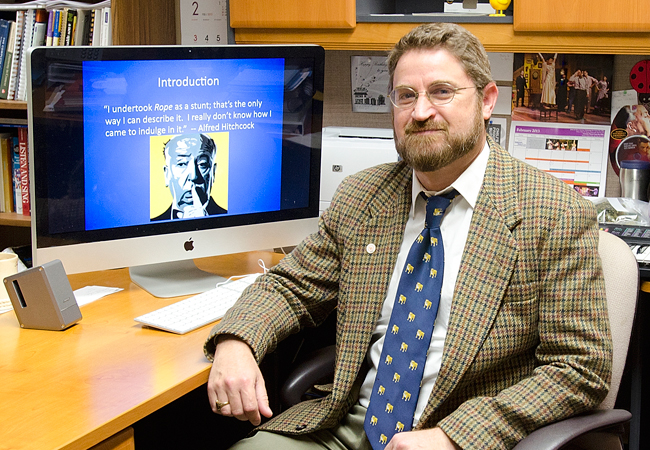Music Speaks Louder Than Words For Professor, Hitchcock Scholar
June 21, 2013
SHSU Media Contact: Jennifer Gauntt
Story By: Kim Kyle Morgan

The Yellow Pages tell us to let our fingers do the walking, but Alfred Hitchcock tells us to let our fingers do the talking—at least that's what Kevin Clifton believes when it comes to Hitchcock’s classic movie Rope.
"There's a great quote that serves as double meaning in the film, when the killer's aunt says to the killer 'These hands will bring you great fame.' She's referring to his pianistic hands, but his hands also embody the tension of a conflicted killer," said Clifton, associate director of the School of Music and assistant professor of music theory at Sam Houston State University.
Clifton began researching the meaning behind the music of Rope in 2010.
The movie, Hitchcock's first American film and his first film in color, was released in 1948. Because it’s based on a 1929 English play of the same title, the film was shot in lengthy 10-minute takes, giving it more of a stage-play feel.
"Music isn't used a lot in the film, but there's this scene where the killer is being questioned by an ex-school teacher at a dinner party, and as he's being questioned, he's playing the piano," Clifton said. "There's a lot of ambiguity in his performance that shows how conflicted he is. He uses his hands to play the piano, and he used his hands to kill…the hands encode a lot of tension."
In the scene, the killer plays "Perpetual Movement," a piano piece by French composer Francis Poulenc.
Clifton wrote both his master's thesis and doctoral dissertation on Poulenc's music.
The music in Rope is diegetic, Clifton said, meaning it’s part of the scene and the characters in the film can hear it. Music added later for background or soundtrack is non-diegetic, used to create mood—think the 'doo do doo do doo do doo doo' right before Jaws leaps out of the water for his kill.
But in Rope, the music adds to the film's narrative, Clifton said.
"He'll stop playing when he feels the conversation isn't going his way, and then he'll suddenly start playing again," Clifton said. "The repetition is part and parcel of his guilt."
Music speaks louder than words
This kind of research allows Clifton to bridge two of his greatest passions: music and movies.
In 2009/2010, Clifton researched, wrote and presented a study on the non-diegetic music of Eyes Wide Shut, a 1999 movie starring Tom Cruise and his then-wife Nicole Kidman.
"In the film, she confesses she almost had an affair," Clifton said. "He's thinking 'how could you do this?' even though she didn't do it and had only thought about it. In the music, there are moments of tension that you expect will be resolved, but that doesn't happen. His character is spiraling out of control. The musicality is part of his identity, and his identity is conflicted. To me, the music is part and parcel of his character."
Clifton doesn't remember a time that music wasn't part and parcel of his own personality.
Originally from Olney, a small town in north Texas, Clifton started piano lessons when he was 4 years old. He earned a music degree with an emphasis on piano performance at Austin College in 1993, followed by a master's degree in music theory at University of Texas-Austin in 1998 and a doctorate in 2002.
Leaving You Hanging... |
Clifton joined the faculty at SHSU in 2010, where his movie-and-music lectures continue to intrigue his students.
"It's Dr. Clifton's research that got me interested in movie music," said Joseph Vranas, a 20-year-old junior. "I was always more engaged in the story telling and camera angles, stuff like that, but after seeing Dr. Clifton's presentation, I found myself watching Rope over and over, picking up something new every time."
In some ways, Rope and the man behind it has left Vranas hanging.
"It's a piece of music that was written before the movie was made, which means Hitchcock selected it for a certain reason,” Vranas said. “Or maybe he wasn't thinking that deep at all; it was just that since the character was a pianist, Hitchcock simply found popular piano music to go with it.”
Hayoung Lim, assistant professor of music therapy and coordinator of the graduate program in music therapy at SHSU's School of Music, said she and her students also enjoyed Clifton's recent Rope lecture.
"It was very stimulating," Lim said. "In the psychology of music, we teach that some music is used for ceremony and some music is used to intensify narration. Kevin's research feeds into that. The students were very attentive, and I actually got a really great research idea myself after his presentation."
Clifton also recently swung his Rope research across the pond. In April he presented at an international conference on music semiotics in Brussels, and in June he visited England for a Francis Poulenc conference.
He's also developing new articles, one that studies the meaning behind the music in Rope's movie trailer and another that analyzes and compares the music of Rope with another Hitchcock thriller, Vertigo, which was released 10 years later.
"Music tends to be a key factor in most of Hitchcock's films, but there is one that doesn't use any music at all," Clifton said.
That would be The Birds. And though there may not be a piano performance in the 1963 flick, Clifton can't help but hear harmony.
"We can interpret the bird sounds as music," he said. "And I think it's perfect the way it is."
- END -
This page maintained by SHSU's Communications Office
Associate Director: Julia May
Manager: Jennifer Gauntt
Located in the 115 Administration Building
Telephone: 936.294.1836; Fax: 936.294.1834
Please send comments, corrections, news tips to Today@Sam.edu.

 SamWeb
SamWeb My Sam
My Sam E-mail
E-mail

